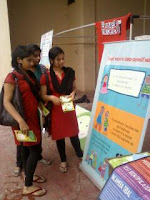'Sensitive reporting of child sex abuse must'
First Published : 03 Dec 2010 02:34:48 AM IST
Last Updated : 03 Dec 2010 10:51:58 AM IST
CHENNAI: A panel discussion on the role of media in shaping opinion on sexual violence against children unanimously called for increased sensitivity to the issue among both journalists and civil society. The panelists called for strong legislation to punish media outfits that pushed the boundaries of sensitive reportage, while also calling on civil society to express themselves in ways that would pressure the government to react decisively to incidents of child sexual abuse.
Noted Tamil writer and columnist Gnani blamed the inability of the Indian society to deal with matters of sexuality for the lack of discourse or proper reaction to instances of child sexual abuse. "We are supposed to be conservative, when we are actually perverted and voyeuristic. Till we deal with sexuality, how can we address sexual abuse?" he asked. He also pointed out that the disturbing trend of parents dressing their children up like glam dolls could be one of the triggers for molestation.
The New Indian Express Editor-in-Chief Aditya Sinha on the other hand called for the enforcement of ethical commitments by media organisations. "Only one news organisation in the country has a publicly stated code of ethics. Stringent legislation is required to check insensitive publication of sexual crimes against children, as media outfits have demonstrated they cannot regulate themselves," said Sinha.
Nilanjana Bose, Features Editor of CNNIBN, said though some media houses were making attempts to be responsible, there was little feedback from the public through regulatory bodies, such as the National Broadcasters' Association.
Every member of the panel though, agreed on the need to sensitise journalists to the precariousness of victims of sexual violence against children. The panel discussion, organised by Tulir, an organisation fighting child sexual abuse, also featured Times of India Metro Editor Arun Ram and media critic Sevanti Ninan. Legal scholar Geeta Ramaseshan moderated the discussion.
 My colleagues and I partnered with an Indian NGO Tulir (www.tulir.org) - Center for the Prevention and Healing of Child Sexual Abuse. We have successfully raised funds to help produce an educational animated film focusing on the topic of child sexual abuse. The film will be produced in three languages targeting over 100,000 children across India.
My colleagues and I partnered with an Indian NGO Tulir (www.tulir.org) - Center for the Prevention and Healing of Child Sexual Abuse. We have successfully raised funds to help produce an educational animated film focusing on the topic of child sexual abuse. The film will be produced in three languages targeting over 100,000 children across India.







